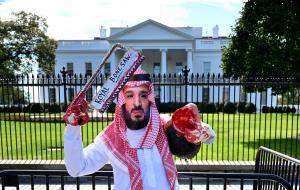Jan. 18 (UPI) — On Nov. 14 of last year, I received an email from the murdered Washington Post journalist Jamal Khashoggi, asking me to take a look at a video link on Saudi Arabia one-man rule. Having had no contact with Khashoggi by email, I became suspicious and emailed back if this was real. I never heard back.
This email it turned out to be a phishing email attempting to hack my account and computer. The real Khashoggi never sent that email. This was the conclusion of months-long investigation by Associated Press and The Citizen Lab over a period of few months and found dozens of phishing emails and messages sent by fake accounts posing as real journalists from the BBC and the Washington Post.
The email from Khashoggi only became haunting after he was murdered at the Saudi Consulate in Istanbul by a hit team close to the Saudi de facto ruler Mohammed bin Salman.
Another email was also significant as it indicates Saudi eyeballs were watching me at an invitation-only event at the American Enterprise Institute last February. The email included a photo of me as a member of the audience at the event featuring the Qatari foreign minister. The use of my photo in an event where I was not listed as a speaker, in which my image appeared for less than 3 seconds, indicates the presence of a Saudi agent at the event who reported my presence.
This conclusion is supported with a secret Saudi foreign ministry letter sent from Riyadh to the Saudi Embassy in Washington, D.C., and was published by WikiLeaks a few years ago. The letter states that the Saudi King has instructed both the Saudi intelligence and the embassy to surveil Ali Al Ahmed and his activities. And they did.
The Saudi surveillance of my movements and their hacking attempts are not the only Saudi activities launched against me, evidenced by the heinous murder of Khashoggi on the orders of the Saudi top leadership.
I live in Virginia, but I also fear for my life and my family. My friend(s) have been brutally murdered by the Saudi monarchy’s medieval machine by execution or assassination. So I am afraid. When I sit at the kitchen table and talk to my kids I feel that my aggressors are already inside my house. This is because they are in my inbox — day after day, trying to trick me into giving them the digital keys to my most sensitive activities. And when my children want to play on the computer I think: How would I feel if they were surveiled by these same adversaries?
I love the freedom that America affords me to speak my mind. America has welcomed me and for decades I felt safe here. But more recently I have grown afraid that America is not able to protect me from these digital and non-digital threats.
So how can America help? The American government lead by this new Congress can show it is serious about attempts by foreign governments to hack persons in United States, like myself. Congressional hearings on this matter are crucial, as the same government who is trying to harm me has targeted members of Congress and waged a campaign of defamation against them for their criticism of its policies. Thus, hearings to determine the tracking and intimidating of exiles living in the United States are warranted.
If a foreign government is attacking American members of Congress, it won’t hesitate to do more for those who have dedicated their lives to stand up for its despotic nature. Protecting people in the United States is protecting American sovereignty and must be taken seriously at the highest levels.
The American government can and should aggressively investigate and prosecute these attempts and other nefarious Saudi activities, including election meddling, infiltration of social media companies and the Saudi ownership in telecommunication companies, such as an upcoming cellphone merger between Sprint and T-Mobile, my service provider. This merger is particularly concerning as it gives the monarchy an added capacity to monitor people in the United States and beyond.
Such investigations would go a long way to protect Americans from the influence of despotic regimes and make people like me feel safe to continue to speak my mind and defend the values that I believe in. Investigations would also help show the governments that try to hack or meddle inside the United States that there are consequences, whether diplomatic or legal, to their aggressive actions.
Ali Al Ahmed is the founder and president of the Institute for Gulf Affairs.

COMMENTS
Please let us know if you're having issues with commenting.